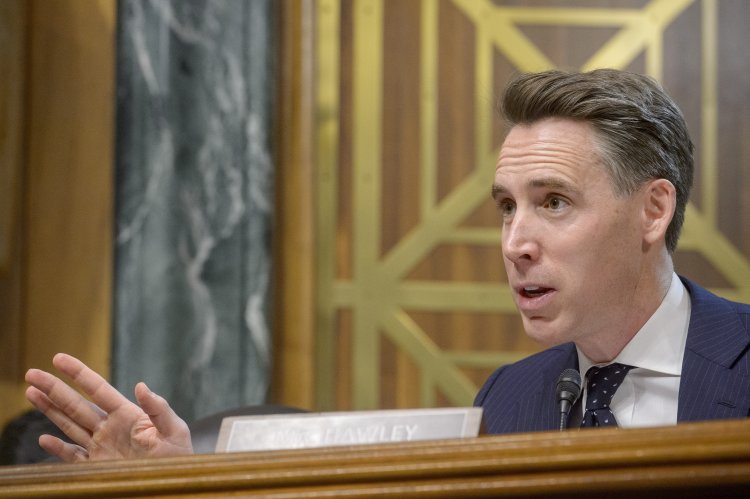Republicans seek to counteract Democrats' edge on family tax credit
Certain GOP lawmakers are seeking to enhance the Child Tax Credit as a strategy to attract working-class voters and counter Democrats' criticisms of their overall tax proposal.

Lawmakers, including Senate Finance Chair Mike Crapo, are considering an increase in the widely popular $2,000-per-child credit as part of the GOP's comprehensive tax legislation. Some are also advocating for a substantial increase in a related benefit known as the babysitter credit.
Addressing this issue now could help Republicans connect with working-class voters, who were instrumental in their recent electoral victories. It would also counter Democratic concerns that the broader tax plan—aimed at extending numerous expiring tax cuts and introducing new ones—overly favors the wealthy.
Traditionally, family tax credits are linked to Democrats and were essential to the Biden administration's pandemic response. However, Sen. Josh Hawley, advocating for a larger Child Tax Credit with a focus on low-income individuals, believes his colleagues need to do more for working-class voters.
“Renewing the tax cuts is great, but there’s no tax relief for working people in that,” he noted. “It’s working people that I’m concerned about, and more of them should be getting more of the credit.”
The initiative appears to be gaining momentum, with the Senate’s primary tax writer indicating that any agreement on the broader GOP plan is “likely” to include some form of expansion.
Behind the scenes, House Republicans, who have kept quiet about their plans, are also supportive of expanding the credit, as numerous Republican senators suggest.
Specifics are still being worked out as lawmakers negotiate the overall shape of their tax agenda, including the necessary spending cuts to balance their proposals.
The budget introduced by Senate Republicans on Wednesday would allocate $1.5 trillion to tax writers while employing a financial strategy that seems to eliminate the cost of extending President Donald Trump's 2017 tax cuts. This would effectively allow for $5.3 trillion in tax cuts—significantly more than needed to extend about 40 provisions that are set to expire at the end of this year.
However, it's uncertain whether deficit-conscious members in the House will endorse the plan.
A considerable expansion of the child credit would mark a proactive approach to an issue that Democrats have recently dominated, following extensive enhancements they implemented during the Covid-19 pandemic.
They significantly increased the credit, removed long-standing work requirements, and enabled millions to claim it in monthly increments, which many Democrats view as a highlight of the Biden administration's achievements. However, they failed to extend it further due in part to opposition from then-Sen. Joe Manchin.
Some Republicans see additional advantages in pursuing this issue, extending beyond just political gain and boosting family finances.
It's one avenue to possibly address the nation's low birth rate, which is a concern among some GOP lawmakers, according to Sen. Steve Daines, who is also involved in tax matters.
“I think it warrants a thoughtful discussion about ways we can incentivize and encourage moms and dads, having children — it’s not easy to raise kids in an environment that’s becoming increasingly expensive, and I speak as the father of four,” he stated.
Meanwhile, Sen. Katie Britt is advocating for an increase in the somewhat lesser-known Child and Dependent Care Credit, another staple among Democrats. This credit helps cover childcare costs like daycare and day camps.
Britt proposes raising the maximum credit from $2,100 to $4,000 for families with at least two children and making it refundable, so individuals can claim it even if they earn too little to owe significant federal income tax.
“One of the things I think we as Republicans have shown in November is that we are the big-tent party,” she remarked. “And the affordability of accessibility of child care is a real issue, from coast to coast.”
However, these proposals face challenges, primarily due to their potential high costs, given the large number of individuals claiming the credits—over 40 million filers annually.
Additionally, this could reignite a long-standing debate among Republicans about undocumented immigrants, as some conservatives argue that while children must be U.S. citizens to receive the child credit, their parents may not be.
The issue of refundability also poses a sensitive topic for Republicans.
Recipients can receive payments from the IRS, and these disbursements have become a significant portion of all child credit claims. This year, more than one-third of the $128 billion cost will stem from government payments, as projected by budget analysts.
Hawley aims to enhance the credit and enable low earners to benefit more by making it refundable against payroll taxes, which represent the largest burdens for low- and moderate-income earners.
“I’m cautiously optimistic,” he remarked.
House Ways and Means Chair Jason Smith has been somewhat reticent about his plans but has historically supported the credit. He previously proposed bipartisan legislation that would have increased the credit available to individuals who do not owe taxes.
However, many Republicans disdain refundable tax credits, viewing them as akin to welfare.
This aspect adds further complexity.
The refundable component of the credit has consistently faced issues with high rates of payments received by ineligible individuals—about 14 percent, according to a Treasury Department watchdog. This raises concerns, especially given the emphasis on reducing government waste by the Department of Government Efficiency.
“We need to eliminate the fraud,” emphasized Sen. John Cornyn.
Crapo opposed Smith’s prior legislation, partly because he believed it would direct excessive funds to those who do not pay income taxes.
However, he has indicated a willingness to increase both the refundable and nonrefundable portions, as long as the balance between them does not favor the refundable side too heavily.
“We’re looking at trying to increase the entire credit,” he stated.
Sophie Wagner for TROIB News
Find more stories on Business, Economy and Finance in TROIB business












